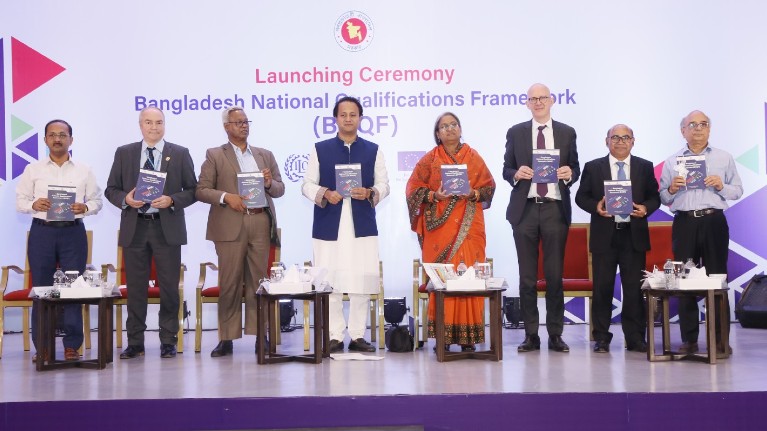The Government of Bangladesh launches the Bangladesh National Qualifications Framework (BNQF)
A significant milestone in the harmonization and strengthening of the educational system of Bangladesh

The Honourable Minister of Education Dr. Dipu Moni M.P graced the BNQF Launching Ceremony as the Chief Guest. Furthermore, the Honourable Deputy Minister of Education Mr. Mohibul Hassan Chowdhury M.P. and H.E. Charles Whiteley, Ambassador and Head of Delegation of the European Union to Bangladesh were present as Special Guests. The Deputy Minister furthermore chaired the technical session.
Commending the contributions by key stakeholders towards the development of the BNQF, the Honourable Minister of Education Dr. Dipu Moni M.P said, ‘‘I am committed to ensuring that the BNQF will now progress to full implementation. This will involve working closely with all stakeholders, including educators, employers, and learners, to ensure full adaptation to the various educational and training sectors and implementation by these in a timely and effective manner.’’
‘’This adaptation of the BNQF will entail the finalization and approval of supporting instruments for the implementation of the BNQF, including the governance framework, the quality assurance framework, and the legislative framework, following international best practices for internationally benchmarked national qualifications frameworks such as the BNQF,” she added.
The Ambassador and Head of Delegation of the European Union in Bangladesh H.E. Charles Whiteley in his remarks recommended that ‘’the BNQF National Steering Committee consider adopting a legislative framework for the effective implementation and long-term sustainability of the BNQF over the coming years and decades.’’ ILO Country Director for Bangladesh Mr Tuomo Poutiainen observed that ‘‘the BNQF is not just a framework for policymakers or educational institutions, but it is a real gateway to empower young people and enable their access to the necessary modern skills and opportunities for productive and decent employment.’’
Honourable Prime Minister Sheikh Hasina was the first to state that a unitary National Qualifications Framework for Bangladesh is a key priority for Bangladesh during the ILO International Skills Summit in 2016. In accordance with this national priority, the Bangladesh National Qualifications Framework (BNQF) was developed by the Technical and Madrasah Education Division (TMED) of the Ministry of Education (MoE) in consultation with all key stakeholders, with technical assistance by the ILO Skills 21 Project and funding from the European Union.
The resulting Bangladesh National Qualifications Framework (BNQF) is an internationally benchmarked instrument for the development, classification and recognition of skills, knowledge and competencies along a continuum of 10 qualification levels covering the three education sub-sectors: 1) general education; 2) technical and vocational education and training (TVET); and 3) Madrasah. The BNQF provides consistent definitions of these 10 qualification levels as well as clear and flexible vertical and horizontal pathways with entry and exit points and progression routes within the qualification structure. These BNQF features ensure easy access to education and training and assists people to move easily between the different education sub-sectors and the labour market. Moreover, in this way the BNQF enables lifelong learning (LLL) and increases the employability of graduates through facilitating recognition and certification of demonstrated skills through measures including non-formal education, informal learning, recognition of prior learning and credit transfer.